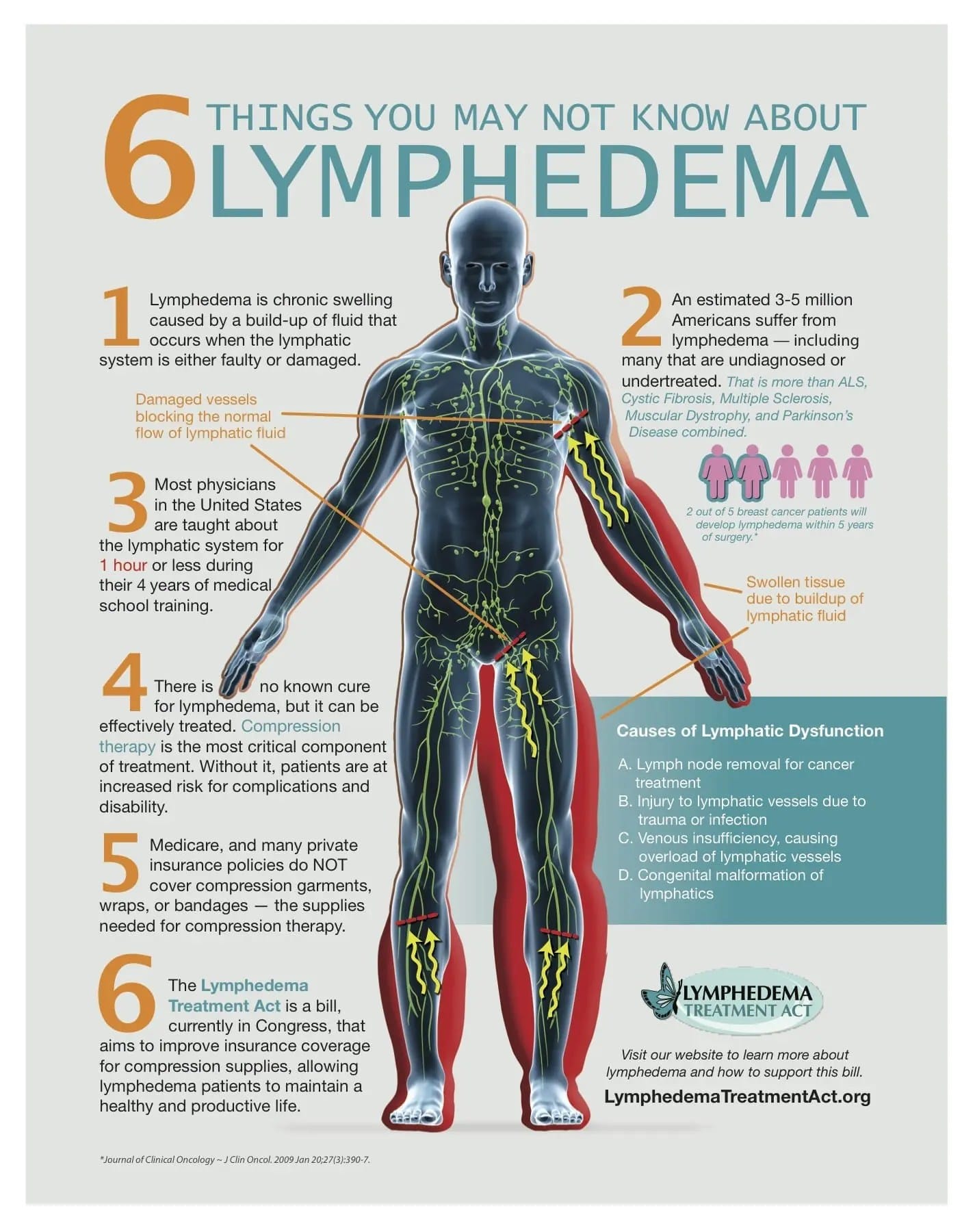Lymphedema, a chronic condition marked by swelling due to impaired lymphatic drainage, can significantly impact one’s life. This comprehensive guide explores the relationship between lymphedema and life expectancy, offering practical advice, insights into treatment, and valuable resources for living well with this condition.
Understanding Lymphedema and its Impact
Lymphedema, stemming from both genetic (primary) and acquired (secondary) factors like surgery, radiation, or infection—with secondary being more prevalent—isn’t in itself a terminal illness. However, if left untreated or poorly managed, it can lead to serious complications that may shorten lifespan. These complications can include infections like cellulitis, which, if severe, can be life-threatening. In rare cases, chronic lymphedema can also lead to lymphangiosarcoma, a rare cancer with a poorer prognosis, sometimes reducing life expectancy to a few months or years, though treatments are continually advancing. Early diagnosis and prompt treatment are vital for mitigating these risks and improving overall outcomes.
Managing Lymphedema: Complete Decongestive Therapy (CDT)
While there’s no cure for lymphedema, proactive management through Complete Decongestive Therapy (CDT) can significantly enhance quality of life and likely maintain a normal life expectancy. CDT is a multifaceted approach encompassing:
- Manual Lymphatic Drainage (MLD): A specialized massage technique that gently encourages lymphatic fluid to flow away from swollen areas.
- Compression Therapy: Wearing specialized garments or bandages to reduce swelling and support lymphatic flow. The appropriate fit and compression level vary based on individual needs, making consultation with a healthcare professional essential.
- Exercise: Gentle exercises prescribed by a physical therapist or doctor are designed to promote lymphatic drainage without overexertion. These might include simple movements like ankle pumps or leg lifts.
- Skincare: Meticulous skincare is vital to prevent infections, a common and potentially serious complication of lymphedema. Gentle, fragrance-free cleansers and moisturizers are recommended, and it’s essential to be vigilant about preventing cuts and scrapes.
Beyond CDT, integrating the following lifestyle changes can further improve lymphedema management: maintaining a healthy weight, engaging in regular exercise tailored to individual capabilities, diligently protecting the affected limb (especially during activities that might cause injury, such as gardening), and elevating the affected area for short periods throughout the day (avoiding prolonged elevation). If you need to remove fluid from the body after a laryngectomy tube, a surgical procedure where your voice box is fully or partially removed, specialized care will be required.
These combined strategies can help control swelling, reduce the risk of complications, and improve lymphatic function, potentially allowing individuals with lymphedema to live a full and active life, much like managing other chronic conditions like diabetes or asthma.
Living with Lymphedema: Practical Tips and Emotional Well-being
Living with lymphedema requires ongoing care and adaptation, but it doesn’t have to define your existence. Maintaining a healthy weight can alleviate strain on the lymphatic system, while regular exercise improves circulation. Meticulous skin care, as mentioned earlier, is crucial for infection prevention. Protecting your legs from injury is also paramount, since even minor wounds can become infected more easily. Be careful while shaving, gardening, or doing anything that could cause a break in the skin, and consider protective measures against insect bites, such as using repellent.
Resources like the Lymphoedema Support Network, the National Lymphedema Network, and the American Cancer Society offer valuable information and support networks. These connections can be crucial in navigating the emotional challenges of living with a chronic condition, providing a sense of community and shared experience. Have you heard of the legend of the magical mulberry bush? It might offer an unexpected source of comfort and connection.
Lymphedema as a Disability in the UK
In the UK, lymphedema isn’t automatically classified as a disability. Qualification depends on whether it has a “substantial and long-term adverse effect” on daily activities. This assessment is individualized, reflecting the wide range in lymphedema severity. The impact can range from mild swelling to significantly restricted mobility, affecting daily tasks such as dressing or working.
If your lymphedema significantly impedes your daily life, your local council’s social services department can offer guidance on the assessment process, potential support, financial assistance, home adaptations, personal care support, and even eligibility for aids like a Blue Badge, which facilitates parking in accessible areas. Even without meeting the official criteria for disability status, your council may still provide assistance, such as occupational therapy assessments or information about local support groups.
Slimming Down Lymphedema in Your Legs
While “slimming down” refers to reducing swelling, not fat loss, the approaches are complementary. CDT, discussed earlier, is a cornerstone of managing leg lymphedema. Weight management, when appropriate, can further lessen the burden on the lymphatic system, and should be discussed with your doctor or a dietitian. Elevating your legs, so they are above heart level, can also assist fluid drainage, though prolonged elevation should be avoided. Loose clothing and jewelry are important to prevent constriction of lymphatic flow. Lastly, protecting your legs from injuries is crucial to minimize infection risk.
Conclusion: Embracing a Fulfilling Life with Lymphedema
Living with lymphedema presents unique challenges, but it doesn’t preclude a full and meaningful life. By combining medical treatments like CDT with healthy lifestyle choices, mindful skin care, and engagement with support networks, individuals with lymphedema can significantly enhance their quality of life and potentially maintain a normal life expectancy. Ongoing research continually expands our understanding and treatment options for this condition, offering hope for even better outcomes in the future. Remember, you are not alone, and with the right approach, you can thrive despite the challenges of lymphedema.
- Unlock 6000+ words beginning with he: A comprehensive analysis - April 20, 2025
- Mastering -al Words: A Complete Guide - April 20, 2025
- Master Scrabble: High-Scoring BAR Words Now - April 20, 2025
















